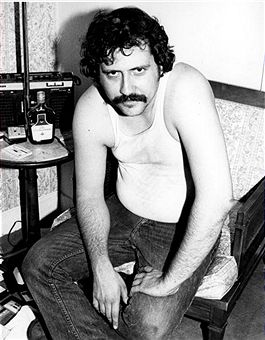
Leslie Conway "Lester" Bangs was an American music journalist and critic. He wrote for Creem and Rolling Stone magazines and was also a performing musician. The music critic Jim DeRogatis called him "America's greatest rock critic".

MC5 was an American rock band formed in Lincoln Park, Michigan, in 1963. The classic line-up consisted of vocalist Rob Tyner, guitarists Wayne Kramer and Fred "Sonic" Smith, bassist Michael Davis, and drummer Dennis Thompson. MC5 were listed by Parade as one of the best rock bands of all time and by VH1 as one of the greatest hard rock artists of all time. The band's first three albums are regarded by many as staples of rock music, and their 1969 song "Kick Out the Jams" is widely covered.
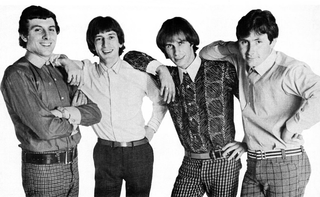
The Troggs are an English beat music band formed in Andover, Hampshire in May 1964. Their most famous songs include the US chart-topper "Wild Thing", "With a Girl Like You" and "Love Is All Around", all of which sold over 1 million copies and were awarded gold discs. "Wild Thing" is ranked No. 257 on the Rolling Stone magazine's list of The 500 Greatest Songs of All Time and was an influence on garage rock and punk rock.
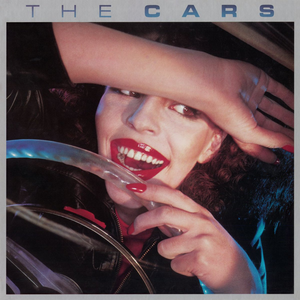
The Cars is the debut studio album by American new wave band the Cars, released in May 1978 by Elektra Records. The album was managed by longtime producer Roy Thomas Baker, and spawned several hit singles, including "Just What I Needed", "My Best Friend's Girl", and "Good Times Roll", as well as other radio and film hits such as "Bye Bye Love" and "Moving in Stereo". The Cars peaked at number 18 on the US Billboard 200 albums chart, and has been certified six-times platinum by the Recording Industry Association of America (RIAA).
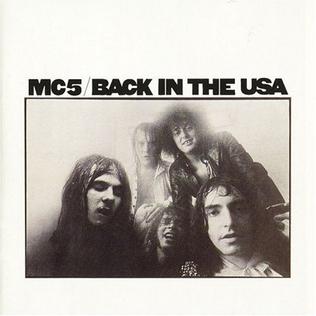
Back in the USA is the first studio album by the American rock band MC5, released on January 15, 1970. It is their second album overall, following 1969's live album Kick Out the Jams.

Kim Anand Thayil is an American musician best known as the lead guitarist of the Seattle-based rock band Soundgarden, which he co-founded with singer Chris Cornell and bassist Hiro Yamamoto in 1984. Cornell and Thayil remained as the original members of the band until Cornell's death in 2017, and the band's subsequent split in 2018. Thayil was named the 100th greatest guitarist of all time by Rolling Stone in 2010, and the 67th greatest guitarist of all time by SPIN in 2012. Thayil has won two Grammy Awards as a member of Soundgarden.
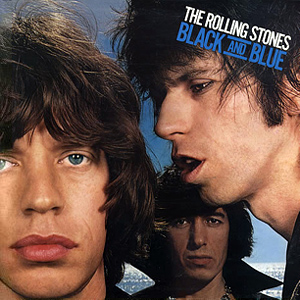
Black and Blue is the thirteenth studio album by the English rock band the Rolling Stones, released on 23 April 1976 by Rolling Stones Records.

Fun House is the second studio album by American rock band the Stooges. It was released on July 7, 1970, by Elektra Records. Though initially commercially unsuccessful, Fun House has since developed a strong cult following. Like its predecessor and successor, it is considered an integral work in the development of punk rock.

High Time is the second and final studio album by the American rock band MC5, released in 1971 by Atlantic Records.

Live at the Apollo is the first live album by James Brown and the Famous Flames, recorded at the Apollo Theater in Harlem in October 1962 and released in May 1963 by King Records. Capturing Brown's popular stage show for the first time on record, the album was a major commercial and critical success and cemented his status as a leading R&B star.

Dave Marsh is an American music critic and radio talk show host. He was an early editor of Creem magazine, has written for various publications such as Newsday, The Village Voice, and Rolling Stone, and has published numerous books about music and musicians, mostly focused on rock music. He is also a committee member of the Rock and Roll Hall of Fame.

Wayne Stanley Kramer was an American guitarist, singer, songwriter, producer, and film and television composer. Kramer came to prominence in the 1960s as the lead guitarist of the Detroit rock band MC5.

Robert W. Derminer, known as Rob Tyner, was an American musician best known as the lead singer for the Detroit proto-punk band MC5. His adopted surname was in tribute to the jazz pianist McCoy Tyner. It was Tyner who issued the rallying cry of "kick out the jams, motherfuckers" at the MC5's live concerts. Tyner had originally auditioned as the bass player, but the band felt his talents would be best used as the lead vocalist.

"Kick Out the Jams" is a song by MC5, released as a single in March 1969 by Elektra Records. The album of the same name caused some controversy due to inflammatory liner notes by the band's manager, John Sinclair, and the track's rallying cry of "Kick out the jams, motherfuckers!". According to guitarist Wayne Kramer, the band recorded this as "Kick out the jams, brothers and sisters!" for the single released for radio play; lead vocalist Rob Tyner claimed this was done without group consensus. The edited version also appeared in some LP copies, which also withdrew Sinclair's excitable comments. The album was released in January 1969; reviews were mixed, but the album was relatively successful, quickly selling over 100,000 copies and peaking at #30 on the Billboard album chart in May 1969 during a 23-week stay.

Michael Davis was an American bass guitarist, singer, songwriter and music producer, best known as a member of the MC5.
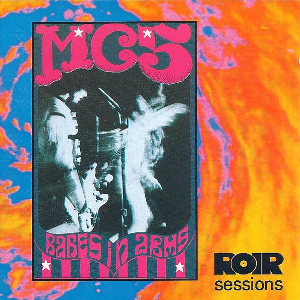
Babes in Arms is an album by the American band MC5, released in 1983. Originally released as a cassette, it has been reissued several times.

Dennis Thompson was an American drummer known for playing with the 1960s–70s Detroit proto-punk/hard rock group MC5, which had a No. 82 US single with "Kick Out the Jams" and a No. 30 US album with the same name.

Teen Age Lust is a live album by American rock band MC5. It was recorded live at the Saginaw Civic Center in Saginaw, Michigan in January 1970. It was released in 1996 on Total Energy Records after digital remastering.

Beware (The Funk Is Everywhere) is a studio album by Afrika Bambaataa, released in 1986 by Tommy Boy Records.
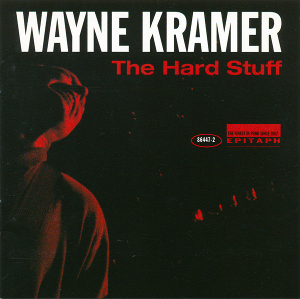
The Hard Stuff is the solo debut album by American musician Wayne Kramer, best known as a guitarist with the 1960s group MC5. It was released on January 10, 1995 by Epitaph Records. Kramer is supported by a range of younger musicians including the band Claw Hammer and members of Bad Religion, the Melvins, and Suicidal Tendencies.




















